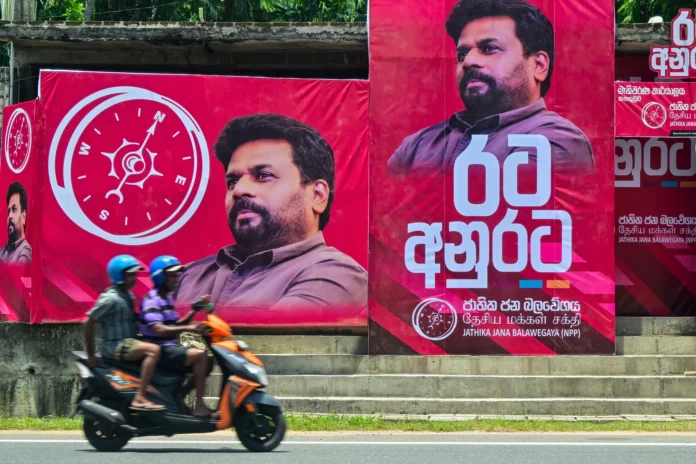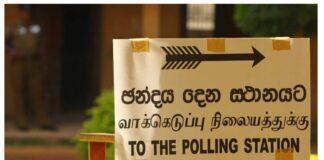By Kassapa
As Sri Lanka awaits what might be a historic general election- in as much the last presidential election was- there is a great deal of speculation about the outcome of the poll. The discussion is not so much about who will win. That appears to be a foregone conclusion. Speculation is more focused on how big that win will be. Some even dare to suggest the possibility of a two-thirds majority.
The Jathika Jana Balavegaya (JJB) is poised to secure a parliamentary majority, becoming the first leftist party to do so without being a coalition partner. That is because of a combination of factors: the element of trust President Anura Kumara Dissanayake is able to generate, the anti-establishment sentiment generated by the ‘aragalaya’ two years ago, the disarray in all other major political parties and the JJB’s strict adherence to party discipline in the face of a cut-throat battle for the preference vote among candidates in other parties.
Among them, the dilapidated state the collective opposition find themselves in is a major concern. The once grand old United National Party (UNP) had split to form the Samagi Jana Balavegaya (SJB) to which most UNP stalwarts decamped. This was replicated on the left of centre fringe when the Sri Lanka Freedom Party (SLFP) split to form the Sri Lanka Podujana Peramuna (SLPP) in which most SLFP politicians took refuge. In an ironic twist that completed this vicious cycle, leading SLPPers have now joined the UNP under the guise of the New Democratic Front (NDF).
Among these parties, the UNP, the SLPP and the SLPP are in varying stages of decay and are ghosts of the parties they once were. The SJB is arguably still the most effective opposition political party, but only just so. Its fragile organisational structure where a ‘Kitchen Cabinet’ of close advisors to Sajith Premadasa dictate terms was laid bare in the lead up to the general election. The laments of Harsha de Silva, Damitha Abeyrathne, Hirunika Premachandra and Ajith Mannaperuma all reflect ineffective leadership and a failure by Premadasa to tackle issues directly. The party will not win the general election and there could then be a putsch to oust Premadasa from the SJB leadership. Sadly, some of its more competent individuals are likely to be deprived of a seat in the next Parliament.
Whatever damages Ranil Wickremesinghe has inflicted on Sri Lanka, his worst political crime is presiding over the demise of the UNP. He has been its party leader for thirty years and has been content to let it falter, fail and flop as long as he is able to remain its leader. At this election, the UNP is not even on the ballot. Instead, its senior members are fighting for their political lives, so much so that Ravi Karunanayake, once tipped as a future party leader, took himself out of the ballot in Colombo and placed himself on the National List. The danger of this decline in the UNP lies in not providing the country’s first leftist government with an effective opposition and with not offering voters with a reasonable alternative, probably even within the next five years.
As for the SLPP, its whole campaign is geared towards one, and only one, objective: gather sufficient votes countrywide to guarantee that the party wins at least one National List seat. That is to ensure that Namal Rajapaksa will be in the next Parliament. That may well happen. The party could even win one or possible two more seats from all the districts. It will be a massive slump for the party which was formed in 2016, won the local government elections in 2018, triumphed at the presidential poll in 2019 and secured the general election in 2020. Its decline has been as rapid as its rise. It can be directly linked to what the party represents: a project to keep the Rajapaksa family ensconced in power. Whether Namal Rajapaksa can get rid of the stigma that now engulfs the Rajapaksa name and make a comeback, a la Ferdinand Bong Bong Marcos, remains to be seen.
The less said about the SLFP, the better. There are now at least three factions that represent that party. Former President Maithripala Sirisena who presided over all its recent turmoil is now distancing himself from the SLFP in the wake of son Daham Sirisena aligning with the Mawbima Janatha Pakshaya (MJP) lead by Dilith Jayaweera. Among the major opposition parties, the SLFP has the least prospects for a revival because leaders of a national stature are sadly lacking in the SLFP now. The 2024 general election may well be the last nail in the SLFP’s political coffin.
It is in such a political landscape that the JJB is thriving. It is in the JJB’s own interests to have an opposition worthy of its name. As post-independent Sri Lankan history testifies all parties which enjoyed two-thirds majorities (the United Front in 1970, the UNP in 1977, the United Peoples Freedom Alliance in 2010 and the SLPP in 2019) ended their terms in government after being extremely unpopular.
Already, although President Dissanayake and Prime Minister Harini Amarasuriya have been circumspect in their public statements, there have been other JJB candidates who have let loose a barrage of questionable utterances and are paying the price for it. This only lends credence to the theory that the lower echelons of the JJB leadership lack political experience. The JJB needs to be confident, not complacent and assured, not arrogant.
The current political dynamics suggest that the JJB will still win a comfortable working majority and secure between 115 to 130 seats in Parliament. The SJB would have done well if it wins 40 seats or more. The NDF will win a few seats in districts with major urban cities. Parties representing the North and East will earn their ‘usual’ representation of the region although the Illankai Tamil Arasu Kachchi (ITAK) will also not be force it once was.
Post-election, the JJB will be busy forming government and attempting to fulfill the many promises it made. The more onerous task will be for the opposition parties. The big question is not whether the JJB will be able to deliver but whether the opposition will be able to regroup, revive and resurrect themselves.



 Logging you in...
Logging you in... Loading IntenseDebate Comments...
Loading IntenseDebate Comments...

